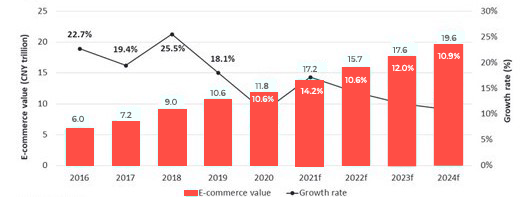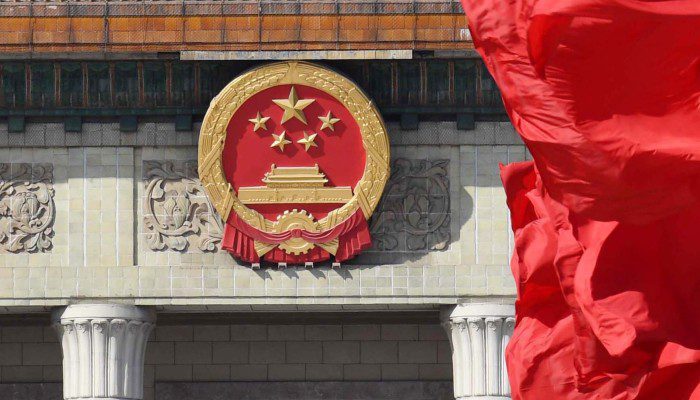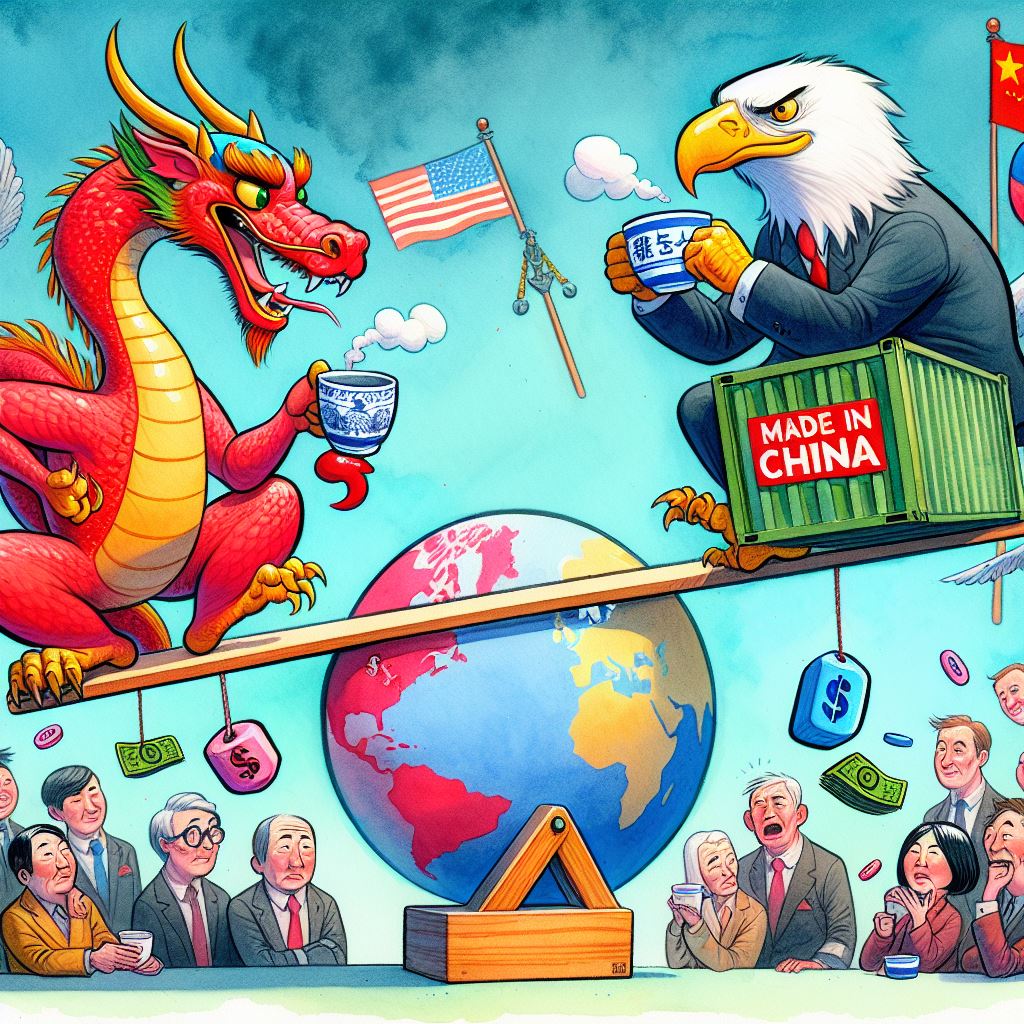E-commerce companies in China are among the biggest in the country and in the world with promulgation only recently executed. Many privately held startup companies that had reached a billion-dollar valuation or so-called Unicorn companies are involved in China’s e-commerce business.
Have a look at our previous article on 2019 Policy Updates – E-commerce Law of China
Beyond the success of the e-commerce industry, however, are continuous challenges related to the environmental effects of delivery packages as well security concerns for online transactions. Thus, China has set its goals to regulate and reform the e-commerce sector.
Significance of Unicorn companies

Top 3 cities in the world with Unicorn companies
Among the unicorn companies in China, 39 belong to the e-commerce industry which translates to about 35.45 percent and forms the majority of China’s unicorn companies.
Venture Capitalist Ailen Lee first coined the term “unicorn company” in her 2013 article. Unicorns in this context signify the rare and “magical” attributes of start-ups that swiftly achieve USD1 billion without having an initial public offering (IPO). Although these companies have not yet been under the scrutiny of public markets, Unicorn companies are very attractive to investors mostly because of their exponential growth rates.
These days, well-funded private markets tend to expand first for a few more years before going public. Some of the leading Unicorn companies in China include:
- ANT Financial
- ByteDance
- Didi Chuxing
- Lu.com
- Alibaba Bendi Shenghuo Fuwu Gongsi
- JD Digits
- DJI Innovations
- JD Logistics
- Bitmain Technologies/Bitmain
- Ke.com
Although fintech companies (companies that use technology to provide their users financial services) are the greatest in terms of valuation, e-commerce companies dominate the scene in terms of numbers.
E-commerce in China
According to the 2021 forecast, China will remain a world leader in the e-commerce industry. China accounts for 33.3 percent of the global e-commerce total value, amounting to USD792.5 million. It is also predicted to produce USD2.779 trillion in e-commerce sales.
Based on GlobalData’s e-commerce Analytics, the e-commerce market in China is expected to register a vigorous growth of 17.2 percent in 2021, as consumers increasingly move from offline to online due to the COVID-19 pandemic.

Source: Global Data, China: E-commerce Value (CNY trillion), 2016-24f
Considering the increasing online trend, China will likely become the first country in history to transact greater than half of its retail sales online.
E-commerce regulation updates
Green development
With the high traffic of e-commerce sales happening in China, it is only natural for the government to regulate the industry. To address environmental concerns, for instance, the Chinese authorities initiated the promotion of e-commerce green development. Thus, many e-commerce enterprises have taken steps to minimize or “slim” the packages of express parcels.
The Chinese local governments have requested e-commerce companies to gradually stop using non-biodegradable plastic bags and disposable woven bags. There are also plenty of environmental steps taken to achieve certain goals such as:
- Promote epidemic prevention and control as well as economic and social development;
- Support the green development capabilities;
- Actively explore the formation of resource-saving, environment-friendly enterprise development model; and
- Promote plastic pollution control, and express packaging green transformation.
According to the Notice from the Ministry of Commerce for the green development of e-commerce enterprises, the following are the relevant steps to reach the above goals:
- Strengthen the concept of green development;
- Raise the level of low-carbon environmental protection;
- Enhance digital operation capabilities;
- Promote the reduction of express packaging;
- Promote recyclable packaging applications;
- Standardize the use of express packaging;
- Implement the responsibility for green management of e-commerce platforms;
- Expand sales of green products;
- Actively guide green consumption;
- Strengthen organization leadership;
- Increase policy support; and
- Strengthen publicity and guidance.
2022-2025 goals
In terms of fast-tracking the e-commerce green transformation, the government plans to optimize the supply of express delivery packaging. This is in accordance with the State Office Letter No. 115 released last year. Furthermore, China will have upgraded the laws and regulations regarding express delivery packaging by 2022. It will also have provided incentives and set up a restraint mechanism for package management.
By 2025, the government will have built a comprehensive green concept-based system and long-term mechanism for the following areas:
- Package production
- Usage recycling and disposal
In addition, e-commerce will not do secondary packaging, and the number of recyclable packages will reach 10 million.
Supervision and administration of online transactions
China’s MOC has formulated measures related to the supervision and administration of online transactions to ensure market stability and security of e-commerce activities.
- Individuals engaged in cleaning, washing, sewing, hairdressing, moving, key preparation, pipe dredging, home appliance furniture repair, and other civil service activities that do not require permission according to the law do not need to be registered.
- If an individual engages in online trading activities and the annual transaction value does not exceed RMB 100,000, that person shall not need to register as well.
- If the same operator opens more than one online store on the same platform or on a different platform, the transaction volume of each store shall be calculated together.
Network trading operators shall not force or disguise consumers to agree to collect or use information that is not directly related to their business activities. These can be done through such methods as:
- General authorization;
- Default authorization;
- Bundling with other authorizations; and
- Discontinuing installation and use.
In other words, if sensitive information such as personal biometrics, medical and health care, financial accounts, or personal whereabouts are concerned, the consent of consumers shall be obtained on a case-by-case basis.
Conclusion
While digital development helps suppress the impact of express delivery packaging on the environment, China is aware of its potential danger in terms of consumer information security. In this regard, many fintech companies (both Unicorns and not) are used on physical retail stores and help make e-commerce much more accessible. Moreover, e-commerce activities have heightened during the pandemic due to the restrictions placed on consumers to purchase outside their homes. This makes regulating the industry much more imperative in order to protect the rights of both consumers and industry players.
Contact us
S.J. Grand provides advisory and support on the business set up as well as tax and accountancy services for foreign-invested companies in China. We assist foreign companies with tax optimization strategies to take advantage of China’s various preferential policies. Contact us to get you started.
Moreover, we have been at the forefront of promoting full automation of business operations, especially for startups and SMEs. We have introduced our Cloud-based advanced solution, Kwikdroid, to make business transactions easier with us, no matter what type or size of the company. Visit our Kwikdroid page to learn more about the services we offer.
You may be interested to read about how to manage your company remotely using the advantages of Kwikdroid. Check it out!







